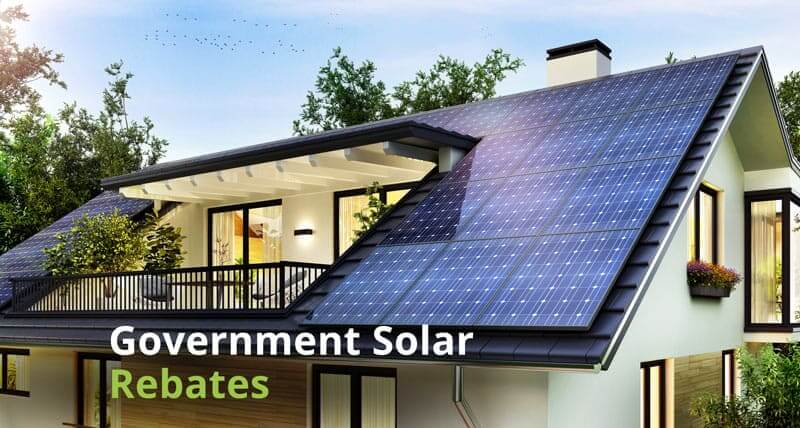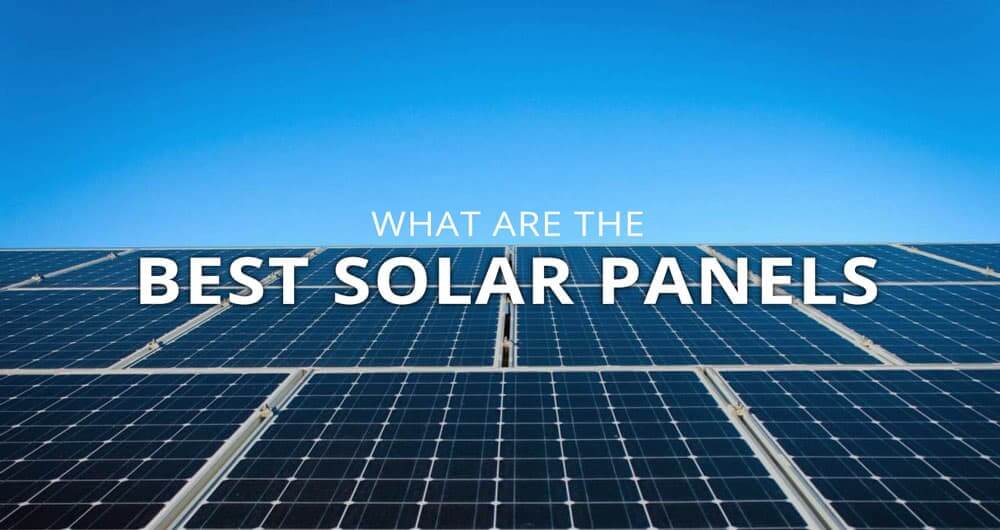Home Pressure Washing Solar Panels
Pressure Washing Solar Panels
Overall, solar panels are pretty low maintenance and keep ticking over without much fuss. They just need a good clean every so often to get rid of any built-up dirt, grime, leaves, and other bits of debris that pile up after a while. If you’re thinking of sorting out the cleaning on your own, it’s natural to consider reaching for a high-pressure cleaner to do the job. But, is that actually the smartest move?
While pressure washers are excellent for cleaning your home’s exterior, such as the roof, gutters, siding, and walkways, they should never be used to clean solar panels. This is because solar panels are not designed to withstand high pressure, and using pressure washers risks damaging them.
In this article, we will educate you on the proper ways to clean your panels and what you should avoid.
Table of Contents
ToggleWhat happens when you pressure wash your solar panels?
Pressure washers may seem to be the faster and easier way to clean solar panels, but they are not recommended because the high pressure can damage the panels.
Here is what can happen if you clean your solar panels with a pressure washer.
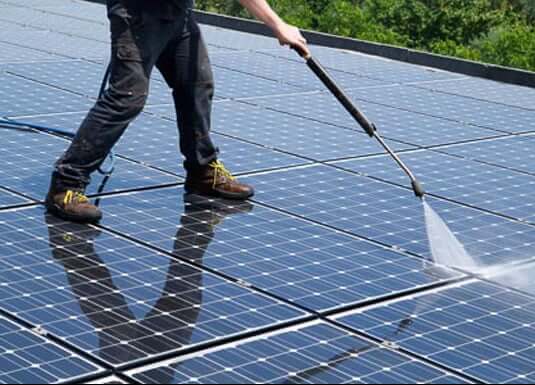
Damage the panel’s coating
Solar panels have a protective coating that protects the metal frame from harsh conditions. The intense pressure from pressure washers may damage this coating.
Over time, the coating may start separating from the glass panes of your panels, exposing them to harsh environmental conditions. This can cause irreversible rust and corrosion that may decrease the efficiency and value of your solar panels.
Void your warranty
Most solar panel manufacturers offer extended warranties for their panels and advise against using pressure washers to clean solar panels. So, if you clean your panels with a pressure washer or any harsh chemicals that can damage them, the manufacturer may decide not to honor the warranty and declare it void.
Cause overspray
Overspray from pressure washing your solar panels can cause problems with your roof over time. If the water is not aligned properly, it can run below the roof and damage the outer coating of your tile, composite, or clay roofing.
How to clean solar panels: 5 tried and tested methods
There are several recommended ways to clean solar panels, including manual cleaning and using automated methods. While rainwater can do most of the cleaning for you, it is not sufficient to remove all the dirt, grime, and debris that accumulate at the bottom of the solar panels.
Below are 5 efficient ways to clean your solar panels.
Robotics
Robotic technology has made solar panel cleaning safer and easier for many solar companies and homeowners. Portable automatic and semi-automatic robots can be installed on commercial and residential properties. The robots make solar panel cleaning easy and fast, and they are especially important for panels installed in dusty environments that require regular cleaning.
Brushes and sponges
Besides robotics technology, many solar panel cleaning and maintenance companies, such as US-based Bland Company and Premier Solar Cleaning, have found out that deionized water works perfectly for cleaning solar panels.
These companies use deionized water with a vehicle-mounted or rolling brush to clean the panels. No soap is used because it can leave streaks and smears that obstruct the panels from receiving maximum sun rays. Soap residues also attract more dust.
Polywater, a lubricant manufacturer, has produced a Solar Panel Wash that can help water remove grime without leaving streaks or films behind. Some companies use a mixture of diluted vinegar and hydrogen peroxide to clean solar panels.
Homeowners can also clean their panels with a soft sponge and a garden hose without any cleaning agents.
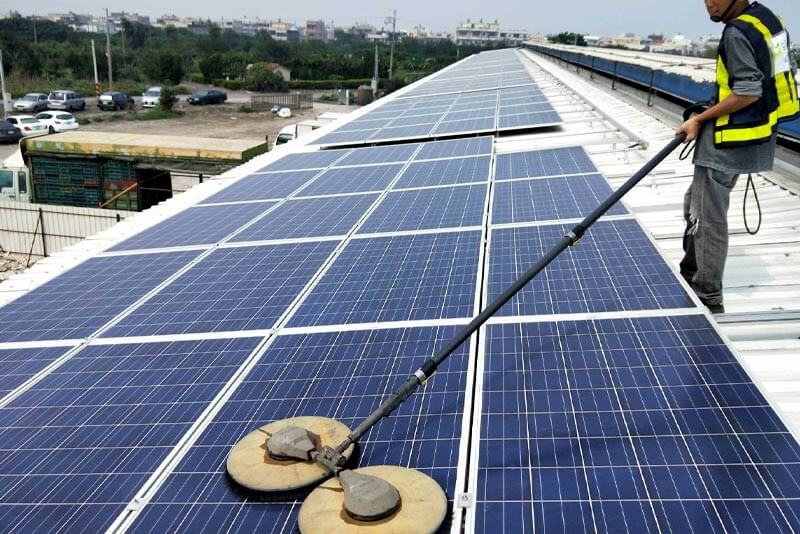
Waterless vibration
Researchers and scientists from Heriot-Watt University have developed a waterless vibration solar panel cleaning method. This method entails attaching a direct current (DC) motor to the panel’s back that induces vertical vibrations that shake off dust and debris from the surface.
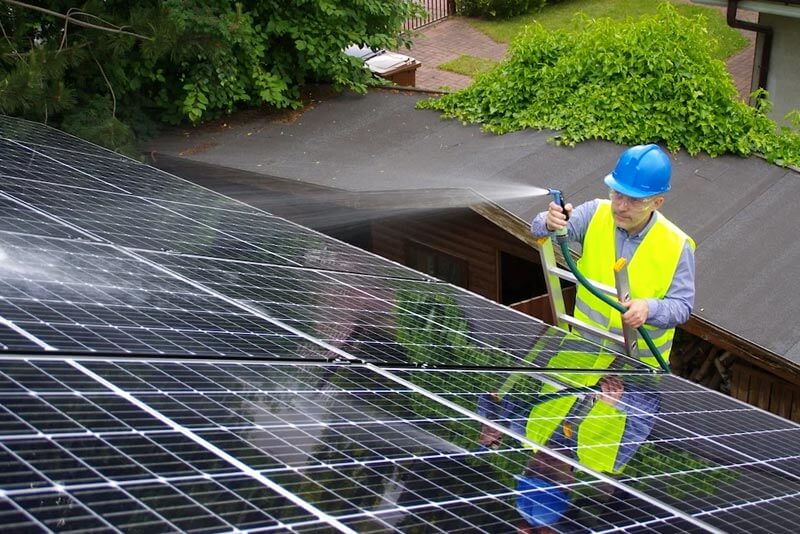
Nanoparticle coating
Nanoparticle cleaning is also a proven method to clean solar panels, according to research conducted by scientists at the International Advanced Research Centre for Powder Metallurgy and New Materials. The nanoparticle coating technology prevents dirt from accumulating on solar panels in harsh climates.
The nanoparticle coat repels dust that can be easily washed off with rainwater or a hose and is highly transparent to avoid reducing the panel’s efficiency.
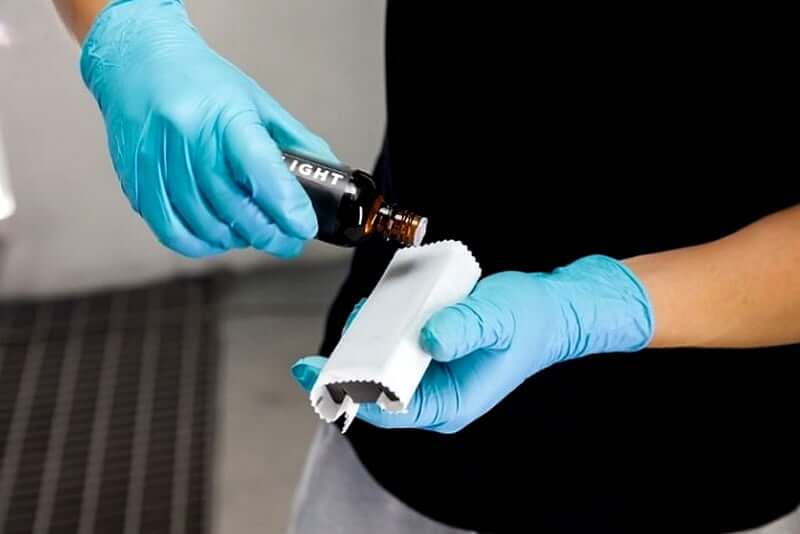
Manual cleaning
Manual cleaning is the all-time best cleaning method for both residential and commercial solar panels.
Innovative solar panel cleaning technologies such as robotics, waterless vibration, and nanoparticle coating are quick and efficient. However, they are expensive and may not be efficient for small residential or commercial installations, or special installations like agrivoltaics.
Manual cleaning is inexpensive, and there are several instruments you can use to clean your panels. For instance, there are special rotating brushes that can remove dirt and grime from the panel’s surface. Basic tools like those used on car windshields can also work perfectly.
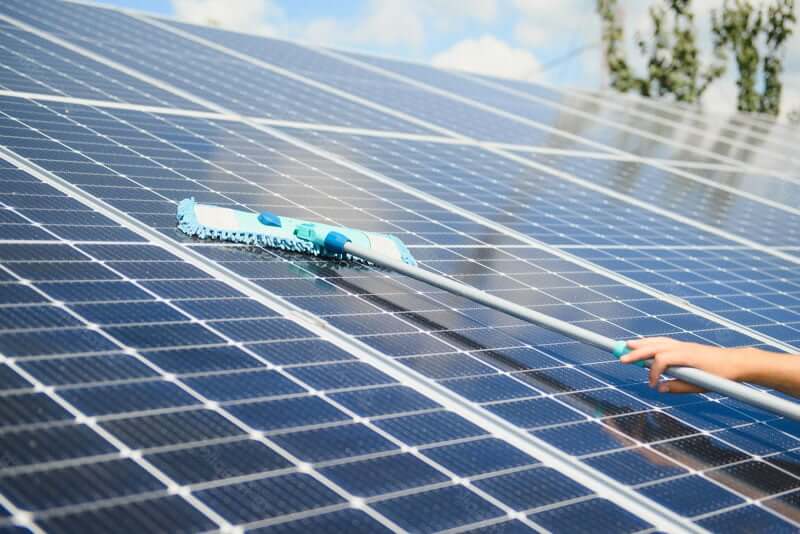
3 ways not to clean your solar panels
Below are cleaning methods you should avoid when cleaning your solar panels.
- Using a pressure washer: as we have already discussed, pressure washers can damage solar panels because the high pressure damages the panels’ surface.
- Using hard bristle brushes: hard bristle brushes can also damage the surface of the panels and impair their efficiency. Soft bristle brushes are the recommended type for cleaning panels.
- Using strong cleaning fluids: while stronger cleaning agents efficiently remove dirt and grime, they are not recommended for use on solar panels. Such cleaning materials contain strong chemicals that can damage the panels and reduce their efficiency.
Can I clean my solar panels with vinegar?
Yes. White vinegar is an excellent option for cleaning solar panels as it contains 5–8% acetic acid that is strong enough to remove stubborn stains and debris without damaging the panels.
You will, however, need to dilute the vinegar as the raw one can still be very strong for the panels. The recommended dilution ratio is 1⁄4 cup of vinegar with 2 cups of de-ionized water.
Can location affect solar panel cleaning?
Solar panels should be cleaned every six months to one year. However, your location will determine how often you clean your panels.
- Deserts: panels in desert areas receive a larger accumulation of dust and sand that can scratch the surface of the panels and block them from receiving enough sunlight. In Australia, the ash from wildfires can also fall on the panels and obstruct them from sunlight. So, you will need to clean your panels more often to maintain their power output and efficiency.
- Polluted areas: panels installed in high-pollution areas such as highways, factories, or airports will have a higher accumulation of atmospheric grime.
- Wooded areas: Leaves and twigs from trees and also droppings from birds may fall on the panels and obstruct them from sunlight. So, if you live in a wooded area, you may need to clean your panels every other week to ensure they maintain efficiency.
How do I know it’s time to clean my solar panels?
If your panels’ efficiency is declining, consider cleaning them immediately. Also, if you live in highly polluted, wooded, or desert areas, you will need to clean your panels more regularly to get rid of the dirt, grime, and debris from leaves and trees.
FAQ's
No, it is not recommended to use hard water as it contains minerals that can cause scaling on the panels, reducing their efficiency and causing damage over time.
Yes, it is recommended to turn off your solar panels, and any electrical equipment for that matter, before cleaning them. While solar panels can withstand harsh Australian weather conditions, water can potentially damage the wiring system and components if it gets on the panels’ underside, especially if you are hosing them down.
It is best practice to follow the manufacturer’s instructions if you are not sure of how to clean your panels, or better yet, hire a professional solar panel cleaning company.
As a general rule of thumb, solar panels should be cleaned at least every six months to a year to maintain their productivity, efficiency, and effectiveness.
However, the need for cleaning your panels may be more frequent depending on the climate of where you live and the level of dirt, debris, and pollution on the panels.
Table of Contents
Toggle


